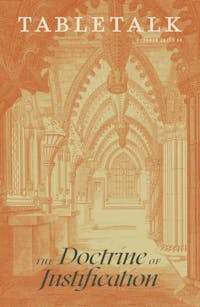
Request your free, three-month trial to Tabletalk magazine. You’ll receive the print issue monthly and gain immediate digital access to decades of archives. This trial is risk-free. No credit card required.
Try Tabletalk NowAlready receive Tabletalk magazine every month?
Verify your email address to gain unlimited access.
Unfortunately, many professing Christians have a simplistic or even wholly inaccurate understanding of justification, thanks in part to men throughout the ages who have complicated and obscured the doctrine. They have done so by blurring the lines between justification and sanctification, stripping Christians of assurance of their salvation by insisting that we cannot be certain of our justification until after the final judgment.
Some readers of Tabletalk might ask, Didn’t the Reformation settle this matter? The answer is yes—as did the Apostle Paul, Jesus Christ, the entirety of the New Testament, and the entirety of the Old Testament, most pointedly in Genesis 15:6: “And [Abraham] believed the LORD, and [the LORD] counted it to him as righteousness.” Nevertheless, as men continue to meddle with the doctrine of justification, we will continue to stand firm on this doctrine by which the church stands or falls, reminding God’s people of this most precious doctrine so that we may rest assured in the promise of God that whoever believes in Christ will not perish but have everlasting life.
The doctrine of justification is indeed simple, though we must not have a simplistic understanding of it. We are of course not justified by believing the doctrine of justification—we are justified through faith alone—but if we do not understand the doctrine rightly, we remain hard pressed to fulfill the covenant that God has made with us for our salvation. Further, we know that we are justified by faith alone and that our faith does not remain alone but bears fruit—our good works demonstrate that our faith is indeed genuine, but they never serve as the basis for our acceptance by God. Indeed, our justification isn’t theoretical—our sanctification proves it.
According to Paul in Romans 1–3, if someone tries to be justified by the law, it is not simply by being a hearer of the law that he will be justified but only if he keeps the entirety of the law will he be justified by God in the end (see Rom. 2:12–16). Yet, we know that none of us is righteous and that none of us mere men can keep the entirety of the Law. But thanks be to God that we have been saved by grace alone through faith alone because of Christ alone. And make no mistake, we are indeed saved by works—Christ’s perfect works in keeping the entirety of the Law, not by our own works. That is why we can sing that the amazing grace that saved us will also lead us home, all by the regenerating, sustaining, and sanctifying power of the Holy Spirit.
